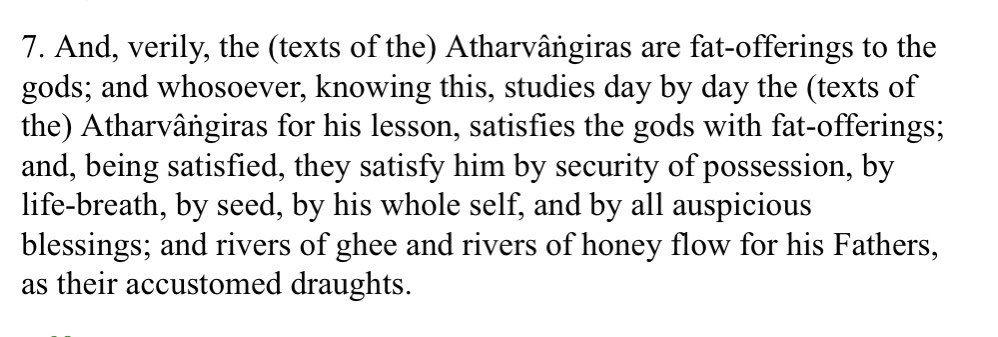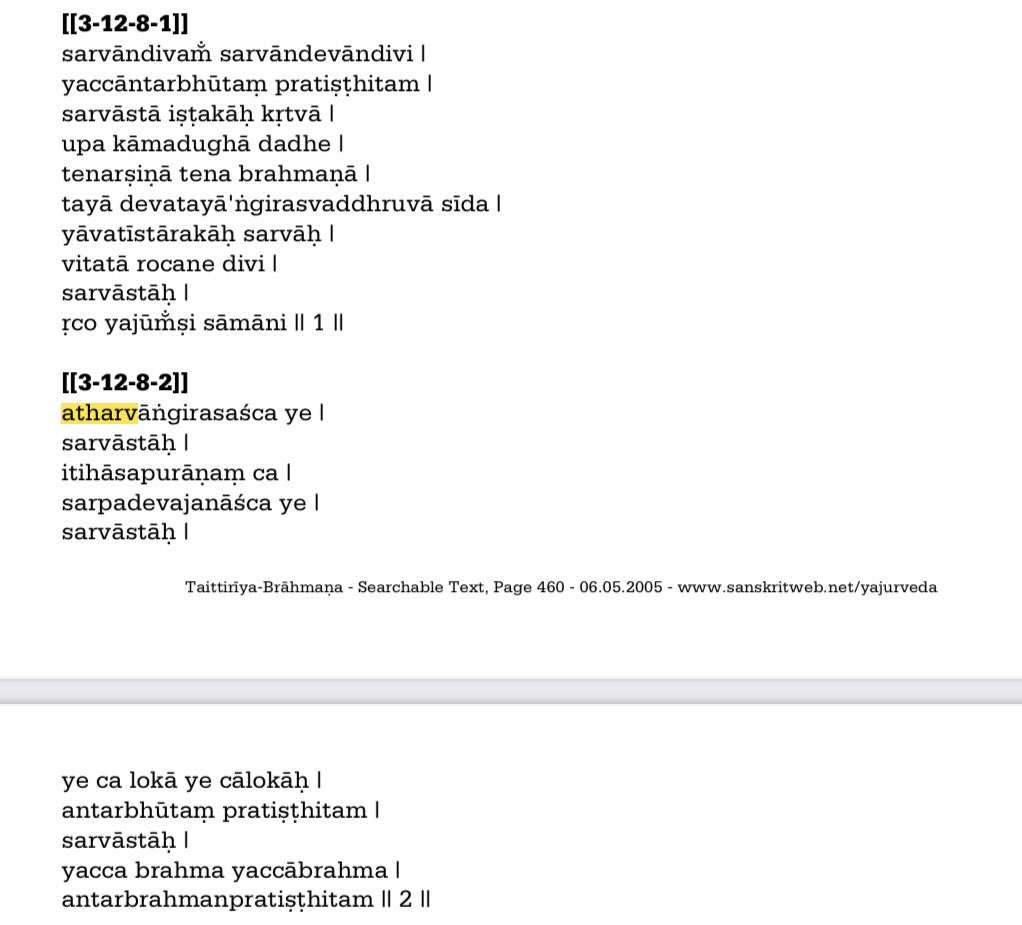Profoundly idiotic piece. Will attempt to dismantle this in a bit. Not many notable points were raised, but these can be sufficiently answered. https://twitter.com/drishtikone/status/1379963585699414016">https://twitter.com/drishtiko...
1) The author begins by admonishing people for neither understanding Yoga nor Hinduism. Then goes ahead and demonstrates that they themselves in their hurry fall for very basic mistakes. Let me show
2) The author starts with the Bhagavad Gita and quotes the verse 9.17, claiming
2) The author starts with the Bhagavad Gita and quotes the verse 9.17, claiming
that the Atharva Veda is not mentioned (relying of course on the translation), following it up with 9.20 to highlight traividyā. This he/she claims is proof that at that time the Atharvana never existed or rather was not known.
This is false.
In 9.17 what is mentioned are the
This is false.
In 9.17 what is mentioned are the
Types of the Vedas and not their mere names.
a) Rk: Sentences having regulated akshara and pada
b) Sāma: Rks set to tune/melody
c) Yajus: Sentences which have unregulated akshara and padas.
This is observable with some analysis of the Vedas themselves
a) Rk: Sentences having regulated akshara and pada
b) Sāma: Rks set to tune/melody
c) Yajus: Sentences which have unregulated akshara and padas.
This is observable with some analysis of the Vedas themselves
The Rgveda consists of Rcas, the Yajur a mix of Rk and Yajus, the Sama is entirely Rca set to tune, and the Atharvana which is a mix of Rca and Yajus.
Moreover, commentaries assert that the च denotes Atharvana.
Refer Madhusudana Sarasvati’s Bhashya
Moreover, commentaries assert that the च denotes Atharvana.
Refer Madhusudana Sarasvati’s Bhashya
In the 9.20 a similar meaning is intended. However, here the inclusion of the Atharvana is curtailed because it is in the context of Yajneshtyadi.
Here is the relevant portion for the same.
Here is the relevant portion for the same.
Now say the author insists that, “No, this is a later commentary. Putting words into Sri Krishna’s mouth. Krishna knew only the 3 Vedas and not more.”
To this, we can still say he/she is wrong.
We can take the aid of the Śatapatha here.
SB 11.5.6. Here we see the part of Vedic
To this, we can still say he/she is wrong.
We can take the aid of the Śatapatha here.
SB 11.5.6. Here we see the part of Vedic
studies.
Now why would a Veda which the author accepts as existing talk about a Veda which the author claims did not exist? Why would he claim that Krishna Who knew the 3 Vedas wouldn’t know about this?
Now why would a Veda which the author accepts as existing talk about a Veda which the author claims did not exist? Why would he claim that Krishna Who knew the 3 Vedas wouldn’t know about this?
We also find this purportedly non-existent at that time text show up in the Taittiriya Brahmana.
“Just as Krishna did not care two hoots for Atharva Veda in Gita.
You know why? Because there was NONE!”
Did Krishna not know? Seems like it’s the author’s ignorance, not Krishna’s
“Just as Krishna did not care two hoots for Atharva Veda in Gita.
You know why? Because there was NONE!”
Did Krishna not know? Seems like it’s the author’s ignorance, not Krishna’s
This deals with the non-existence of Atharvana portion and all points that relied upon this premise are by extension refuted.
2) The Adiyogi assertion of Mahadeva and the incorrect apprehension of the word Svayambhu. For this I shall take the aid of the primary text of Yoga
2) The Adiyogi assertion of Mahadeva and the incorrect apprehension of the word Svayambhu. For this I shall take the aid of the primary text of Yoga
The Yogasūtra. Before that, the incorrect usage of the word Svayambhu.
Author says, “One who attained to on his own”, such is an unheard of definition. Svayambhu is self born. Refer to Mānavadharma Śāstra (1.6)
ततः स्वयम्भूर्भगवानव्यक्तो व्यञ्जयन्निदम् इति
Referent is obvious.
Author says, “One who attained to on his own”, such is an unheard of definition. Svayambhu is self born. Refer to Mānavadharma Śāstra (1.6)
ततः स्वयम्भूर्भगवानव्यक्तो व्यञ्जयन्निदम् इति
Referent is obvious.
Now back to the Ādiguru. The author, perhaps based on his Guru’s teachings says that Śiva “attained to the Source and embraced the infinite in its completeness.” Matrix jargon apart, this is in direct contradiction to the statements of the Yogasūtra. Let’s see how.
स एषः पूर्वेषामपि गुरुः कालेनानवच्छेदात् (1.26)
[The previously mentioned Īśvara] is the Guru of those who came first/before, since He is unaffected by Time.
This at least establishes that Īśvara is the first Guru or Ādiguru.
What is the Visheshata of Īśvara?
[The previously mentioned Īśvara] is the Guru of those who came first/before, since He is unaffected by Time.
This at least establishes that Īśvara is the first Guru or Ādiguru.
What is the Visheshata of Īśvara?
क्लेश कर्म विपाकाशयैःपरामृष्टः पुरुषविशेष ईश्वरः (1.24)
“Ishwara is a special kind of Being, untouched by ignorance and the products of ignorance, not subject to karmas or saṃskāras or the results of action.”
तत्र निरतिशयं सर्वज्ञबीजम् (1.25)
“In Him, knowledge is infinite”
“Ishwara is a special kind of Being, untouched by ignorance and the products of ignorance, not subject to karmas or saṃskāras or the results of action.”
तत्र निरतिशयं सर्वज्ञबीजम् (1.25)
“In Him, knowledge is infinite”
Doesn’t this completely contradict what the author is saying about Śiva? That He needed to do something to attain His infinitude? Yet another false claim conjured up in a whim. All associated points collapse with it.
To add insult to injury, Bhagavān Vyāsa very firmly asserts तस्य शास्त्रं निमित्तम् meaning that Īśvara can only be known through the Śāstras. Also stating that the relation between the Vedas and Īśvara is beginning-less. This itself shows that Yoga is intertwined with the Vedas.
The author’s baseless assertion that “Yoga has no alliance nor any brief from any of the Vedas.” is exactly that, something which has no basis. Why bother to respond to the rest of the building built upon this shaky foundation?
Just an addendum in refutation of the following word salad: “The intertwining of Yogic experiential learning codified as methods in everyday life such that it gives rise to a mass and broad-based culture of awareness, acceptance,... a cultural ethos that was known as Hinduism.”
What an unnecessarily convoluted and meaningless statement. What difference is there between Hinduism and say Keto diet? Such is not the case.
यतोऽभ्युदयनिःश्रेयससिद्धिः स धर्मः
Dharma (is) that from which (results) the accomplishment of Exaltation and of the Supreme Good
यतोऽभ्युदयनिःश्रेयससिद्धिः स धर्मः
Dharma (is) that from which (results) the accomplishment of Exaltation and of the Supreme Good
तद्वचनादाम्नायस्य प्रामाण्यम्
The authoritativeness of the Veda (arises from its) being the Word of God [or being an exposition of dharma].
Simple, gives enough scope for range of practices.
Conclusion: Please don’t fall for such divorce attempts. Yoga is Hindu. Always.
The authoritativeness of the Veda (arises from its) being the Word of God [or being an exposition of dharma].
Simple, gives enough scope for range of practices.
Conclusion: Please don’t fall for such divorce attempts. Yoga is Hindu. Always.

 Read on Twitter
Read on Twitter





